As the four-year anniversary of the July 3, 2013 ouster of President Mohamed Morsi of the Muslim Brotherhood approaches, POMED Deputy Director for Research Amy Hawthorne discussed the situation in Egypt with Nonresident Senior Fellow Dr. Ashraf El Sherif.
To read this Q&A as a PDF, click here.
 POMED: As we look back over the past four years, can you begin by identifying a few of the most important turning points since then-defense minister Abdel Fattah al-Sisi led the ouster of President Mohamed Morsi on July 3, 2013?
POMED: As we look back over the past four years, can you begin by identifying a few of the most important turning points since then-defense minister Abdel Fattah al-Sisi led the ouster of President Mohamed Morsi on July 3, 2013?
Ashraf El Sherif: One of them was July 26, 2013, actually. On that day many Egyptians heeded al-Sisi’s command to take to the streets to give him and the military a popular mandate to “fight terrorism.” That day marked the real beginning of direct military rule.
Right after the military removed Morsi from power, civilian politicians led the interim government that had just taken office. Many politicians naively believed that the military would move into the background, and let the civilians rule and “reset” the failed democratic transition. But one of the first signs of the bloody character of the military takeover appeared on July 8, when the army killed 51 Brotherhood supporters demonstrating at the Republican Guard headquarters where they believed Morsi was being held. Hundreds were wounded.
Then on July 24, al-Sisi gave an angry speech at Cairo’s military academy. The figurehead interim president Adly Mansour should have been the one to address the nation, but al-Sisi’s speech left no doubt about who was running the show. Al-Sisi called on “honest Egyptians” to go into the streets two days later to give him a “mandate against terrorism.” By “terrorism” he meant mainly opposition from the Muslim Brotherhood and its Islamist allies, as well as from any secular democratic forces that might question the new political order. The speech made plain the military’s plan: an indefinite closing of the public sphere in order to impose “stability” and save the nation.
Large numbers heeded al-Sisi’s call and turned out on July 26. We don’t know exactly how many, but the perception of full support created by the pro-state media was what mattered. The media portrayed a weary population disgruntled by the Brotherhood’s brief tenure in power, exhausted by the disorder following the 2011 uprising, and demanding a decisive military crackdown. The message was that al-Sisi had been mandated by the people to enter into a full-scale confrontation with the Brotherhood. The new power structure was set. Every feature of the transition “road map” announced on July 3—the new constitution in 2014, the presidential elections later that year, and the parliamentary elections in 2015—was mere window-dressing for military rule.
The Raba’a massacre came just weeks later.
Many Egyptians prefer to ignore the significance of what happened on August 14, 2013, when the police and army killed at least 800 Morsi supporters gathered for mass sit-ins in two squares in Cairo in broad daylight.[1] But it was a seminal day in Egypt’s history.
In the summer of 2013 there was a popular anti-Brotherhood propaganda song called “ihna sha’ab, intu sha’ab” (we are one people, you another). With Raba’a, the message in the song became a scary reality. The massacre divided friends and families and tore apart the social fabric.
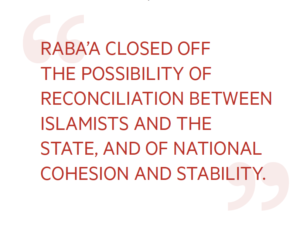 The government and the elite stoked a sort of hysteria towards the Brotherhood, and this took hold among the urban middle and lower middle classes in a way I had never witnessed. Many questioned the number of victims, depicted them as armed criminals who had instigated violence, and excused the military’s attack on the protesters as deserved. For their part, Raba’a victims developed a powerful counter-narrative of martyrdom, and a thirst for revenge against the ‘regime’s people,’ whom they depicted as enemies of Islam.
The government and the elite stoked a sort of hysteria towards the Brotherhood, and this took hold among the urban middle and lower middle classes in a way I had never witnessed. Many questioned the number of victims, depicted them as armed criminals who had instigated violence, and excused the military’s attack on the protesters as deserved. For their part, Raba’a victims developed a powerful counter-narrative of martyrdom, and a thirst for revenge against the ‘regime’s people,’ whom they depicted as enemies of Islam.
Raba’a closed off the possibility of reconciliation between Islamists and the state, and of national cohesion and stability. The consequences of this tragedy, the divisions and the grievances, will remain with us for a long time, forestalling any democratic reopening.
At the time of Raba’a and for some time after, al-Sisi had intense popular support and was portrayed as a national savior. When did this start to change?
His initial fervent support was based on two myths. First, that al-Sisi saved the nation from certain disaster under the Brotherhood. Second, that only he and the military could deliver economic results, progress, and modernity to Egypt.
Several episodes from 2014 onward chipped away at these myths. The first one occurred in February 2014, when al-Sisi and top military officials appeared at a ceremony, aired on national television, to announce a supposed invention to detect and treat AIDS and Hepatitis C. (The latter disease afflicts up to 20 percent of Egyptians, one of the highest rates of prevalence in the world.) The army-affiliated lead scientist on the project bizarrely claimed that the device would turn the viruses into kofta, or meat balls. (Unsurprisingly, the scientist was outed as a swindler after his misrepresentations of his education were exposed.) Even worse, the device bore a suspicious resemblance to fake bomb detectors that had caused a huge scandal in Iraq.
Egyptians mocked the episode as ‘kofta-gate’ and, true to form, created hilarious jokes lampooning it. But it was deeply shocking to see the army’s active support, on national television no less, for such a farce, with al-Sisi and top military brass sitting in the front row for the presentation. Many continued to give al-Sisi the benefit of the doubt after this embarrassing episode, but it weakened the military’s reputation for scientific, administrative, and managerial superiority.
In 2015 the public mood soured noticeably. Al-Sisi’s lavish mega-projects, such as the Suez Canal expansion, did not deliver their promised results. The economy did not grow; living standards for the majority of Egyptians, already poor, sunk lower; and public services deteriorated further. Al-Sisi demoted or removed public officials tasked with fighting corruption, showing the hollowness of his rhetoric about doing away with the corruption of the Mubarak era.
And what has changed in the past year?
The Tiran and Sanafir islands affair, an ongoing controversy that arose in spring 2016, dealt a serious blow to the image of al-Sisi as the nation’s savior. On April 9, 2016, the Egyptian government announced it had agreed to ‘return’ the two Red Sea islands to Saudi administration as part of a maritime border agreement signed between the two countries. The decision was widely perceived in Egypt as a national humiliation and a blatant sell-off to Saudi Arabia, the major external backer of the regime. A protest campaign against the ceding of Egyptian territory met with some success in the streets and in the courts, and was viewed with sympathy by some elite and government circles. The Tiran and Sanafir controversy has damaged the pro-Sisi camp, which built its legitimacy upon a nationalist mythology steeped in jingoism.
Fall 2016 saw the float of the Egyptian pound, the implementation of austerity plans, a huge wave of inflation, and further economic weakening. Tourism has not recovered due to global impressions of political instability and security threats in the country. Public debts are soaring. Egypt’s balance of payments problem has become more acute. The dream of attracting foreign investment that will transform the economy—the rationale for the $12 billion International Monetary Fund (IMF) loan program that al-Sisi signed on to in November 2016—is not coming true anytime soon.
It is evident that al-Sisi’s image as national savior was manufactured and hollow. The economic and security problems that he and his supporters blamed on the Brotherhood and on the 2011 uprising still exist. Indeed, they are worse now. Terrorist incidents occur at an increasing rate inside and outside the Sinai Peninsula. This is despite the fact that the Brotherhood has been completely eliminated from the public sphere, and that the uprising was extinguished four years ago.
How strong is support for al-Sisi now?
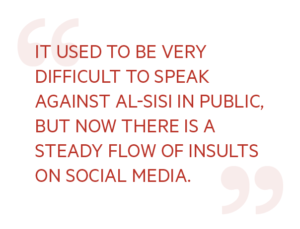 It is impossible to know for sure because we don’t have accurate measurements of public opinion in Egypt. But there is a strong sense that many Egyptians no longer believe in an al-Sisi “miracle” or in the myth of the army. It used to be very difficult to speak against al-Sisi in public, but now there is a steady flow of insults on social media. Al-Sisi does not enjoy the public deference shown to Egypt’s previous strongmen, even to the unpopular Mubarak. This erosion of presidential prestige is just one sign of our deep crisis of governance and state-society relations.
It is impossible to know for sure because we don’t have accurate measurements of public opinion in Egypt. But there is a strong sense that many Egyptians no longer believe in an al-Sisi “miracle” or in the myth of the army. It used to be very difficult to speak against al-Sisi in public, but now there is a steady flow of insults on social media. Al-Sisi does not enjoy the public deference shown to Egypt’s previous strongmen, even to the unpopular Mubarak. This erosion of presidential prestige is just one sign of our deep crisis of governance and state-society relations.
Nowadays the only Egyptians offering al-Sisi enthusiastic and unconditional support are hardcore fans of the military, those who are rich enough to survive the economic crisis, and those who have a direct stake in the regime and its patronage systems. After only three years in office, al-Sisi’s legitimacy, originally based on grandiose promises of delivering full security and economic growth, has narrowed to fear-mongering against the despised Brotherhood, fighting terrorism, and preventing chaos. His only effective ruling tool is fear.
To be sure, most of those who oppose al-Sisi do so passively. Most of his detractors are not likely to go out into the streets. They see no alternative to his rule, and many fear the regime’s harsh repression. Apparently, the majority of Egyptians prefer a failed dictatorship to the risk of chaos.
What do you see as the main differences between the regime of Hosni Mubarak (1981-2011) and that of al-Sisi?
The main one is that the military now has a much larger political role. Under Mubarak, the military was ruling but not governing, to quote Steven Cook.[2] The military was allowed to retain its own sphere of economic activity, with its own budget, shielded from civilian oversight. Retired military officers were appointed to lucrative positions in the civilian administration such as public sector organizations, municipal governments, and other state institutions. But active military officers did not rule directly. Political institutions such as the presidency and the ruling National Democratic Party (NDP) were distinct from the army. Mubarak presided over a sort of balance among the presidency, the military, the bureaucracy, and police.
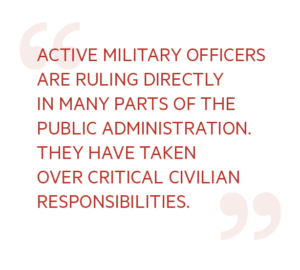 Under al-Sisi, the military is trying to rule and govern. The current regime is a pyramid of control with the military at the top; the intelligence services in the middle; and other power-centers such as the police, the judiciary, and the state bureaucracy at the bottom.
Under al-Sisi, the military is trying to rule and govern. The current regime is a pyramid of control with the military at the top; the intelligence services in the middle; and other power-centers such as the police, the judiciary, and the state bureaucracy at the bottom.
The army is expanding its economic empire, crowding out the public and private sectors. The military has become an even more privileged economic actor. It is not taxed, it is not subject to competition, it uses free conscript labor, and it monopolizes public land and other public resources—all with no public oversight.
Active military officers are ruling directly in many parts of the public administration. They have taken over critical civilian responsibilities such as food supply, health care, infrastructure, and other public services. The military presents itself as the exclusive guardian of the state, with the right to rule without any democratic trappings or the division of labor with other state institutions that we had under Mubarak.
What do you mean, without democratic trappings?
In addition to the unprecedented crackdown on Islamists, the regime is closing off all pluralism and meaningful participation, to a greater degree than we ever saw under Mubarak. The state engineered a rubber-stamp parliament in the 2015 elections.[3] This subordinated parliament just approved the transfer of the two islands to Saudi Arabia despite strong popular opposition and some dissent within the regime. It is also engineering a subordinated judiciary. After the 2011 uprising, and particularly since al-Sisi came to power, the judiciary became politicized; to crush the revolutionary and pro-democracy cause as well as the Brotherhood, it has often dispensed with due process in a flagrant way. In April, to neutralize any independent judges left in the system, the parliament passed legislation to quash the last vestiges of judicial autonomy. Judicial institutions have lost credibility in an unprecedented manner.
Al-Sisi also has ratified a draconian civic associations law that extinguishes independent civil society. The government cancelled student elections on university campuses. Political activists involved with the movement opposed to the transfer of Tiran and Sanafir islands and with a potential presidential election campaign by prominent human rights lawyer Khalid Ali have been rounded up in recent weeks.
And I have to mention the emerging state control over media, which involves blocking key independent online media websites and establishing military and intelligence-owned television channels and radio stations such as DMC.
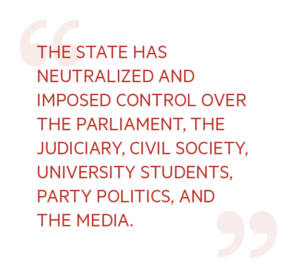 The state has neutralized and imposed control over the parliament, the judiciary, civil society, university students, party politics, and the media. This situation goes far beyond the relatively liberalized authoritarianism of the Mubarak era.
The state has neutralized and imposed control over the parliament, the judiciary, civil society, university students, party politics, and the media. This situation goes far beyond the relatively liberalized authoritarianism of the Mubarak era.
You have written that al-Sisi’s regime is a “non-regime.” What do you mean?
Under Mubarak, the state was corrupt and vastly inefficient, but it was more predictable. It had a coherent decision-making process and some degree of order to its public policies.
By contrast, the system over which al-Sisi presides is too chaotic to qualify as a modern authoritarian regime. It is a complicated structure of competing patrimonial, self-centered, and oligarchic Mafia-type institutions that act more like the gated fiefdoms of the Mamluk age than modern state bodies. Their incompetence and inefficiency is matched only by the viciousness of their conspiracy-mongering discourse.
Take for example the divisions within the regime over the IMF program and other aspects of economic policy. The IMF program is based on Egypt’s commitment to implement reforms intended to attract foreign direct investment in the private sector, which is expected to grow the economy and increase employment. But the state is not actually opening the market to investment or competition. It is adopting policies, such as allowing the military a monopoly over many parts of the economy, that go directly against the IMF agenda and make life hell for much of the private sector.
Moreover, the hierarchy of national security decision-making is not as clear as it was under Mubarak. Inside the various security agencies there are different interests and areas of specialization, making it hard to define who has the final say on key decisions. For instance, who manages the state’s campaign against the Brotherhood: the traditional state security agency or the newly dominant military intelligence? On policy toward Hamas, the Palestinian conflict, and the conflict in Sinai, there seem to be overlapping portfolios between general intelligence and military intelligence. It is not at all apparent who provides the key intelligence and recommendations to al-Sisi regarding the serious security implications of the economic austerity policies carried out under the IMF program.
How is al-Sisi’s repression different than Mubarak’s?
Mubarak ruled Egypt with repression, obviously, and he did not deliver economic development. But he was careful to provide space for the private sector and to allow a limited, though controlled, degree of independent civic activity. He maintained a minimal social protection net as a safety valve.
Now, with the economy too weak to sustain the near-defunct welfare state set up under Gamal Abdel Nasser, and the regime too weak to allow for a public sphere to re-emerge, al-Sisi only wields the stick; he has no carrot. His authoritarianism offers no development, no welfare, and no space whatsoever for expressing discontent—he is closing down all channels of participation. Egyptians are expected to obey and suffer in silence. His repression has allowed him to keep his grip on power so far, but ultimately Egypt needs a more stable and meaningful social contract.
All of the presidents of Egypt, except for Mohamed Morsi, have come from the military. How is al-Sisi different?
Nasser, Anwar al-Sadat, and Mubarak all had years of political experience outside the army before they ascended to the presidency. Nasser had overlapping memberships in different political movements across the country (including communist, Islamist, and nationalist groups), and he waited four years after leading the 1952 coup before assuming the presidency. Sadat belonged to many underground political organizations when he was young and had 18 years of experience in official government posts before becoming president in 1970. Even Mubarak, who was an apolitical air force officer during his military career, left the military and spent five years as vice president before assuming the presidency after Sadat’s assassination in 1981.
By contrast, al-Sisi had zero civilian experience before ascending to the leadership of the country. He even appeared in his military uniform when he announced his decision to run for president, and his announcement came only after the Supreme Council of Armed Forces had officially approved his nomination. Nasser, Sadat, and Mubarak were never officially nominated by the military to run for president.
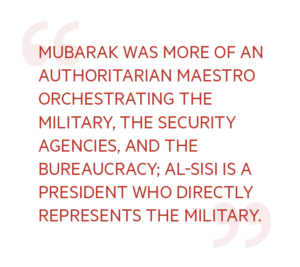 Mubarak was more of an authoritarian maestro orchestrating the military, the security agencies, and the bureaucracy; al-Sisi is a president who directly represents the military. Mubarak had a ruling party, the National Democratic Party (NDP). Al-Sisi has no ruling party. Military intelligence tried to create a quasi-ruling party for the 2015 parliamentary elections, but it did not succeed, and al-Sisi seems uninterested in rectifying this. Egypt is witnessing the death of even pro-regime politics.
Mubarak was more of an authoritarian maestro orchestrating the military, the security agencies, and the bureaucracy; al-Sisi is a president who directly represents the military. Mubarak had a ruling party, the National Democratic Party (NDP). Al-Sisi has no ruling party. Military intelligence tried to create a quasi-ruling party for the 2015 parliamentary elections, but it did not succeed, and al-Sisi seems uninterested in rectifying this. Egypt is witnessing the death of even pro-regime politics.
Whereas Mubarak ran a real institution called the presidency with its own power base in the form of the NDP, there is no longer an autonomous presidency under al-Sisi. The military has taken over the presidency by installing top advisors to the president whose direct ties, power base, and agenda derive from the military. This is disastrous. Egyptians will make the military responsible for the state’s policy failures, which will erode the military’s power and legitimacy and weaken the country’s security.
Were you surprised by the failure of the Brotherhood?
The group’s ideological intransigence and authoritarian tendencies did not surprise me, but the swiftness of its failure did. I was taken aback by their political incompetence. The whole paradigm of a marriage of “moderate Islamism” and a form of conservative pluralist democracy collapsed in only one year and now stands in ruins. Ironically, the group’s raison d’etre (at least as claimed by the group and its sympathizers) was to serve as a bridge between Islamists and the state. Today, polarization between Islamists and non-Islamists has reached unprecedented levels. The scope of the Brotherhood’s failure, and how swiftly the wave of anti-Islamist hatred swept through the Egyptian public, was really striking.
And how do you assess the performance of secular political forces since 2013?
Non-Islamist political forces have been ideologically bankrupt, ineffectual, and irrelevant.
Our so-called liberal and secularist forces were more than happy to sacrifice any possibility of liberal democracy at the altar of a military state that could fulfill their immediate priority of containing the Islamists. Their fear of Islamism led them to look upon the state as their guardian and to justify its authoritarianism. They have betrayed the basic principles of liberalism: individual freedoms, checks and balances in state power, and the rule of law. All they have gotten since 2013 is an illiberal, non-secularist, militaristic state.
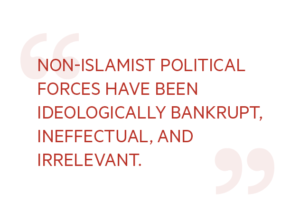 To make matters worse, some of these so-called liberals view the current regime as a champion of secularism and modernization. To anyone who knows the realities of the modern Egyptian state on questions of religion, identity, and culture, this is laughable.
To make matters worse, some of these so-called liberals view the current regime as a champion of secularism and modernization. To anyone who knows the realities of the modern Egyptian state on questions of religion, identity, and culture, this is laughable.
The democratic left was unable to develop itself as an influential political force. It has failed on the perennial five questions of organization, platform, constituency, leadership, and discourse. Nationalists such as Nasserists are anti-democratic by definition, so I didn’t expect much from them. But initially I thought the democratic left and its plethora of post-2011 political parties and civil society organizations, as the self-proclaimed representatives of the democratic revolutionary cause in Egypt, had real potential.[4] Egypt has such serious structural economic crises that parties and movements emphasizing rights and social justice would seem to have a natural constituency. But the democratic left totally failed to find its voice.
Also disappointing, and revealing, is the decadence of our educated bourgeoisie. Our elites should be the ones to lead the country with a modernizing vision. Instead, the big families, the upper class, the leaders of important economic sectors, state functionaries, intellectuals, academics, artists—with some exceptions, of course—have entertained fascist ideas and rejected progressive ones. Their fear of uncertainty has led them to accept the myths of al-Sisi as savior and the military as secularist modernizer. The business elite do not even organize and lobby for their own interests effectively. Businessmen have resorted to taking out newspaper advertisements pleading for al-Sisi’s merciful intervention to alleviate the damage that the regime’s economic policies, such as restrictions on free trade and currency exchange, have inflicted on their companies.
What do you think the outside world does not understand about the situation inside Egypt right now?
Our body politic is deteriorating dangerously. Egypt is experiencing multiple crises of legitimacy and governance that predate the 2011 revolution. These crises are structural and revolve around the political economy of resource production, distribution, and state-society relations, and around questions of rights, autonomy, empowerment, and equal opportunity. Al-Sisi is making all these crises worse. His failures of governance and basic resource provision are destructive to all elements of society, from health to education to the economy. The judiciary, which had been a state institution with some level of prestige and public trust, has become politicized and co-opted by the regime to the point of caricature.
Also worrying is how the state and its supporters, invoking a chauvinistic and at times xenophobic nationalism, are giving themselves the right to categorize so many Egyptians as traitors. The mass media now label as troublemakers and fifth columnists not just the familiar “enemies” such as the Brotherhood and human rights groups, but also labor activists, leaders of professional syndicates, opposition activists, and even the poor. Some elites are asking the state to silence these people by force, to do whatever it takes to impose order and stability. There are no longer any restraints protecting the people from the state.
Egypt is moving slowly but surely toward a catastrophe caused by mounting policy failures, security failures, economic crises, social tensions, and political grievances. We are nearing the edge of the cliff.
NOTES
1. The state perpetrated several mass killings of protesters after Morsi’s ouster, but Raba’a was the biggest and most iconic.
2. Steven A. Cook, Ruling but Not Governing (Baltimore: Johns Hopkins University Press, 2007).
3. For more on Egypt’s rubber-stamp parliament, see Ragab Saad, “All the President’s MPs: The Egyptian Parliament’s Role in Burying Human Rights and Silencing Dissent,” Project on Middle East Democracy, June 2017, https://mideastdc.org/pomed-publications/pomed-snapshot-all-the-presidents-mps-the-egyptian-parliaments-role-in-burying-human-rights-and-silencing-dissent/
4. In this group, I include al-Dustour Party, the Socialist Popular Alliance Party, the Egyptian Social Democratic Party, and the Bread and Freedom Party.
DR. ASHRAF EL SHERIF is a Nonresident Senior Fellow at POMED. Based in Egypt, El Sherif is a lecturer in political science at the American University in Cairo. He previously served as a nonresident associate in the Democracy and Rule of Law Program at the Carnegie Endowment for International Peace. He is an expert in political Islam, democratic transitions, social movements, the relationship between ideology and politics, and state-society relations in the Middle East and North Africa. El Sherif holds a PhD in Political Science from Boston University.




